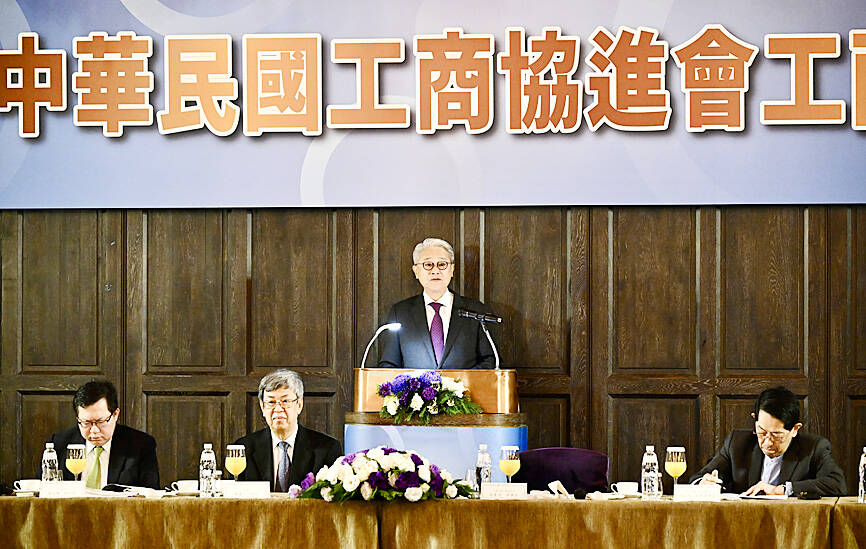The Chinese National Association of Industry and Commerce (CNAIC, 工商協進會) yesterday called on the government to ease labor rules, and allow manufactures and hospitality providers to hire migrant workers to tackle a labor shortage.
The trade group made the plea and other suggestions during a breakfast meeting with Premier Chen Chien-jen (陳建仁), Vice Premier Cheng Wen-tsan (鄭文燦) and other Cabinet ministers.
CNAIC secretary James Chu (朱曦) said policymakers can lend a helping hand in easing labor shortages that have been plaguing the tourism sector, as well as manufacturers of textile and electrical products.

Photo: Peter Lo, Taipei Times
In particular, Chu cited Formosa International Hotels Corp (晶華國際酒店集團) chairman Steve Pan (潘思亮) as saying that popular hotels and restaurants are afraid of taking reservations not due to tepid business, but due to a lack of personnel.
Hospitality operators cannot find employees to fill vacancies even after raising wages moderately, which shows that the phenomenon requires solutions other than wage increases, Chu quoted Pan as saying.
Tourism operators have been calling on the government to ease labor rules so that they can hire migrant workers. Migrant workers can only work at factories, construction sites and as caregivers.
Cheng said the Cabinet would give the issue “positive consideration,” without elaborating.
Minister of Labor Hsu Ming-chun (許銘春) said the ministry has made efforts in talent matching, but the results have proven unsatisfactory, due to gaps over wage expectations.
The minister suggested that companies further raise wages and reduce qualification requirements by hiring middle-aged jobseekers, especially people who want to rejoin the workforce after spending time raising children.
The CNAIC said the government can mitigate labor shortages in the textile sector by stepping up efforts to recruit foreign talent, extending visa durations for migrant workers and increasing the number of conscripts performing alternative military service.
Surveys have shown that young people prefer to enter high-tech firms, which provide better compensation packages than non-tech companies, while high-tech firms complain about a lack of talent.
Policymakers should consider providing extra tax incentives, such as income tax breaks, to foreign talent and local companies hiring skilled foreign professionals, Chu said.
Companies could be allowed to list foreign professionals’ spousal travel expenses and their children’s school fees as expenses, Chu added.
The labor ministry should set up a Web site devoted to foreigners working in Taiwan to help attract foreign talent, the CNAIC said.

To many, Tatu City on the outskirts of Nairobi looks like a success. The first city entirely built by a private company to be operational in east Africa, with about 25,000 people living and working there, it accounts for about two-thirds of all foreign investment in Kenya. Its low-tax status has attracted more than 100 businesses including Heineken, coffee brand Dormans, and the biggest call-center and cold-chain transport firms in the region. However, to some local politicians, Tatu City has looked more like a target for extortion. A parade of governors have demanded land worth millions of dollars in exchange

Hong Kong authorities ramped up sales of the local dollar as the greenback’s slide threatened the foreign-exchange peg. The Hong Kong Monetary Authority (HKMA) sold a record HK$60.5 billion (US$7.8 billion) of the city’s currency, according to an alert sent on its Bloomberg page yesterday in Asia, after it tested the upper end of its trading band. That added to the HK$56.1 billion of sales versus the greenback since Friday. The rapid intervention signals efforts from the city’s authorities to limit the local currency’s moves within its HK$7.75 to HK$7.85 per US dollar trading band. Heavy sales of the local dollar by

Taiwan Semiconductor Manufacturing Co’s (TSMC, 台積電) revenue jumped 48 percent last month, underscoring how electronics firms scrambled to acquire essential components before global tariffs took effect. The main chipmaker for Apple Inc and Nvidia Corp reported monthly sales of NT$349.6 billion (US$11.6 billion). That compares with the average analysts’ estimate for a 38 percent rise in second-quarter revenue. US President Donald Trump’s trade war is prompting economists to retool GDP forecasts worldwide, casting doubt over the outlook for everything from iPhone demand to computing and datacenter construction. However, TSMC — a barometer for global tech spending given its central role in the

An Indonesian animated movie is smashing regional box office records and could be set for wider success as it prepares to open beyond the Southeast Asian archipelago’s silver screens. Jumbo — a film based on the adventures of main character, Don, a large orphaned Indonesian boy facing bullying at school — last month became the highest-grossing Southeast Asian animated film, raking in more than US$8 million. Released at the end of March to coincide with the Eid holidays after the Islamic fasting month of Ramadan, the movie has hit 8 million ticket sales, the third-highest in Indonesian cinema history, Film